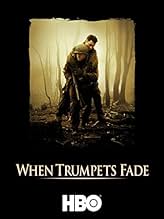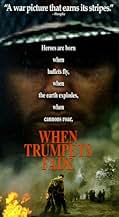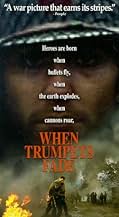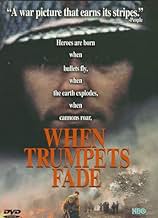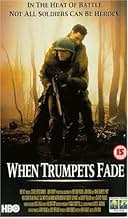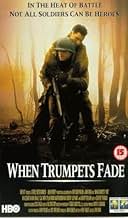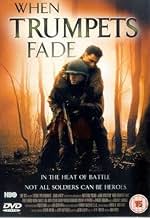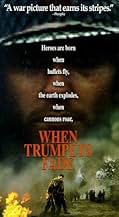AVALIAÇÃO DA IMDb
7,0/10
8,9 mil
SUA AVALIAÇÃO
Adicionar um enredo no seu idiomaA private in the latter days of WWII on the German front struggles between his will to survive and what his superiors perceive as a battlefield instinct.A private in the latter days of WWII on the German front struggles between his will to survive and what his superiors perceive as a battlefield instinct.A private in the latter days of WWII on the German front struggles between his will to survive and what his superiors perceive as a battlefield instinct.
- Direção
- Roteirista
- Artistas
- Prêmios
- 1 vitória e 5 indicações no total
Frank-Michael Köbe
- German Sergeant
- (as Frank Köbe)
Matthew Rutson Cooney
- Driver Corporal
- (as Matthew Ruston Cooney)
Brian Hicks
- 1st Sergeant
- (as Gy. Sgt. Brian Hicks USMC)
John Miller
- Radio Man
- (as Cpl. John Miller USMC)
Peter Thomas
- News Footage Narrator
- (narração)
Avaliações em destaque
This is a must see film. It presents war realistically. Just as in real combat, some soldiers are reluctant to attack, some officers are not that smart, many soldiers are scared, and the mission is of dubious value.
This particular story focuses on one soldier who was the lone survivor of an allied attack or the Germans. He is promoted to Sgt. against his wishes because they are short of people. Put in charge of new replacements, he is torn between training the new men, and staying out of the fight so he will stay alive.
After another failed attack by his company, he is promoted to Lt. Again he does not want this responsibility, but now has to lead men into battle.
Its one of the few films that show how inept some officers are. Band of brothers is the only other film I can think of that shows an inept American officer, Capt. Herbert Sobel (played by David Schwimmer).
Its also one of the few American films about the Battle of the Hertgen Forrest, which was overshadowed a few months later by the Battle of the Bulge.
This particular story focuses on one soldier who was the lone survivor of an allied attack or the Germans. He is promoted to Sgt. against his wishes because they are short of people. Put in charge of new replacements, he is torn between training the new men, and staying out of the fight so he will stay alive.
After another failed attack by his company, he is promoted to Lt. Again he does not want this responsibility, but now has to lead men into battle.
Its one of the few films that show how inept some officers are. Band of brothers is the only other film I can think of that shows an inept American officer, Capt. Herbert Sobel (played by David Schwimmer).
Its also one of the few American films about the Battle of the Hertgen Forrest, which was overshadowed a few months later by the Battle of the Bulge.
This is the most stressful war movie I have seen since first seeing "All Quiet On the Western Front" which was made in 1930. It is sad to realize that wars can still be supported by sane people. Hitler realized how dangerous the 1930 movie was to his agenda and the Nazis harassed movie goers and put stink bombs in the theaters to deter viewers. I don't think those in the U.S. who never seem to see a war they do not wish to get into would want anyone to see this one. Therefore I heartily recommend it to all. I would have liked to know the fate of the lieutenant at the end though.
A tense and unforgiving war epic that follows David Manning (Ron Eldard), an American soldier in World War II who tries to get a discharge for being mental unstable although his superior officer, Captain Roy Pritchett (Martin Donovan) who immediately promotes him to be the squad leader of a platoon where all the members are new and inexperienced.
The performances here are nothing short of excellent, the battle scenes are well-executed, and Thomas Burstyn's photography isn't only gloomy, it also hides some unexpected surprises from Germans to mines, that are hidden in the ground.
Director John Irvin, who is no stranger to making effective and intelligent war films ("Hamburger Hill", "The Dogs of War") and turning raw talent into top-notch, has made another classic here. What this film has in common with the previous movies is that one or some of the characters are cynical or determined to survive. However, it's a shame that this film was only made for cable instead of being given a fair chance to gain some attention at the box office.
The performances here are nothing short of excellent, the battle scenes are well-executed, and Thomas Burstyn's photography isn't only gloomy, it also hides some unexpected surprises from Germans to mines, that are hidden in the ground.
Director John Irvin, who is no stranger to making effective and intelligent war films ("Hamburger Hill", "The Dogs of War") and turning raw talent into top-notch, has made another classic here. What this film has in common with the previous movies is that one or some of the characters are cynical or determined to survive. However, it's a shame that this film was only made for cable instead of being given a fair chance to gain some attention at the box office.
The film makers obviously intended a memorial to the soldiers who fought and died in the Hurtgen Forest. Though this was not a docudrama, the story had to be true to the context, and for what I could tell, it definitely achieved that goal. The Battle was not a victory for the U.S. forces. The Germans pushed back the Allies during this battle, creating the "bulge" in the front lines. The Battle of the Bulge was a later victory, and it is duly remembered. But the Hurtgen Forest campaign, which was a defeat and by many commentators is viewed as a huge strategic blunder paid for in American blood, has largely been forgotten.
Why does everyone (including viewers) assume that Manning is a coward? Because he is the only survivor of his platoon? Perhaps that assumption accurately reflects the command mindset which caused so many deaths: death is so cheap that one more death is expected, in order to prove valor. (That is not a new concept, "The Red Badge of Courage" had it in a Civil War context; but it also seems to be a motivation for contemporary suicide bombers.) Contrast that with these soldiers' motives for the last mission--when the objective was clear: to save their own lives, rather than to make a noble but unavailing gesture.
Usually war films have more plot. But the Hurtgen Forest campaign was not as carefully plotted as a screenplay. Did any mission in this film seem to have any real point? The battle is accurately reflected here. This is not a compelling film, and it does not attempt to impart any great moral lessons, but it's best virtue is that it is honest.
My late father was in the "Bloody Bucket" (the 28th Infantry, Pennsylvania National Guard--note the red keystone insignia) during this battle, and he was fortunate to have survived. Decades later, he often would say to me that the trees could kill you. I was never really sure what he meant. This film showed me what he meant: the tree tops which were blown off by artillery fire would fall on the soldiers below.
Why does everyone (including viewers) assume that Manning is a coward? Because he is the only survivor of his platoon? Perhaps that assumption accurately reflects the command mindset which caused so many deaths: death is so cheap that one more death is expected, in order to prove valor. (That is not a new concept, "The Red Badge of Courage" had it in a Civil War context; but it also seems to be a motivation for contemporary suicide bombers.) Contrast that with these soldiers' motives for the last mission--when the objective was clear: to save their own lives, rather than to make a noble but unavailing gesture.
Usually war films have more plot. But the Hurtgen Forest campaign was not as carefully plotted as a screenplay. Did any mission in this film seem to have any real point? The battle is accurately reflected here. This is not a compelling film, and it does not attempt to impart any great moral lessons, but it's best virtue is that it is honest.
My late father was in the "Bloody Bucket" (the 28th Infantry, Pennsylvania National Guard--note the red keystone insignia) during this battle, and he was fortunate to have survived. Decades later, he often would say to me that the trees could kill you. I was never really sure what he meant. This film showed me what he meant: the tree tops which were blown off by artillery fire would fall on the soldiers below.
Due to the fact that the two films came out close together, it is tempting to compare When Trumpets Fade to Saving Private Ryan. This would be a mistake. Unlike Private Ryan, Trumpets is not an epic set to a background of a crucial point in history, like D-Day, nor are the central characters members of an elite unit who are given a "heroic" assignment. Instead, the main character, Manning (Eldard), starts off as a private reluctant to risk his life, but who finds himself promoted and burdened with increasing responsibilities he does not want as his unit suffers horrendous attrition attempting to fight its way into Germany in late 1944. Manning's dilemma both contrasts and parallels that of his company commander, Captain Pritchett (Donovan), who has to balance achieving the objectives he has been assigned and keeping as many of his men alive as he can, and succeeding at neither. The greatest contrast with Private Ryan, however, comes in the form of the replacement troops, all green recruits with no combat experience - a far cry from Captain Miller's seasoned Rangers. Rounding it off is Dwight Yoakam as the nameless battalion commander who is unapologetic about driving his men to the slaughter, but whose face betrays the fact that, as with Captain Pritchett, their deaths weigh heavily upon him. When Trumpets Fade successfully showcases combat at its most gruesome and frustrating as Captain Pritchett's company batters itself to pieces against its target with nothing to show for the effort and bravery of the men except an ever-increasing pile of American corpses. But we get two good looks at the face of a German squad leader, portrayed by Frank-Michael Köbe, and in it we can see the despondency of a man who knows that he is fighting only to postpone the inevitable defeat of his country. A gritty, realistic, and depressing, but nonetheless excellent film.
Você sabia?
- CuriosidadesThe red keystone unit patch signifies that Manning and the others are part of the The 28th Infantry Division. The 28th is a unit of the Army National Guard and is the oldest division-sized unit in the US armed forces.
- Erros de gravaçãoThe Dragons teeth of the Siegfried line are not shown as they really were (and in numerous places still are today). 1) In the movie the line is built with four rows of teeth. In reality the line is built with five rows. 2) The teeth are in reality not made in one size as shown in the movie, but in 3 different sizes, where the first and last rows contain the biggest pillars, the middle three are middle sized, and woven in the last row you can find the smallest. 3) The rows are not placed exactly behind each other. If you would see them from above, you would see an angle in the middle. 4) The rows of pillars are also not built in one line. If you would look over a row from the side, you would see a zigzag of pillars. 5) The pillars in the movie are too close to each other. In reality, the area between two pillars is so big, you can park a car between them (as is done by the author of this comment on numerous occasions).
- Citações
Pvt. David Manning: If I can help you in any way without endangering my own life, I won't hesitate. But I'm not taking a bullet for anybody!
Lt. Lukas: That's not good enough.
Pvt. David Manning: That's as good as it gets.
- ConexõesReferenced in Ban the Sadist Videos! (2005)
Principais escolhas
Faça login para avaliar e ver a lista de recomendações personalizadas
Detalhes
- Tempo de duração1 hora 35 minutos
- Cor
- Mixagem de som
- Proporção
- 1.33 : 1
Contribua para esta página
Sugerir uma alteração ou adicionar conteúdo ausente

Principal brecha
By what name was Quando os Bravos se Calam (1998) officially released in Canada in English?
Responda

